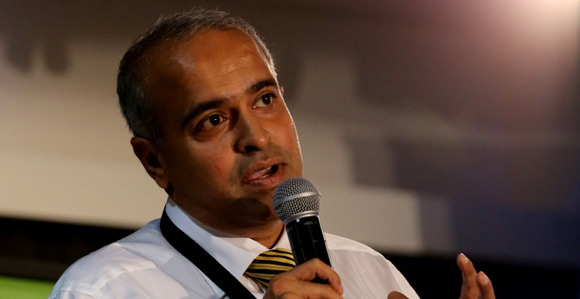With money finally in the bank and an experienced hand at the helm, are the fortunes of PNG’s troubled mobile phone company Bemobile about to turn? Business Advantage PNG spoke with Sundar Ramamurthy – who last week became its ninth CEO and its fourth in a year – to find out.

Bemobile’s Sundar Ramamurthy
Few people know Papua New Guinea’s information and communications technology sector better than Sundar Ramamurthy. As founder of Data Nets in the early 1990s, he helped pioneered the development of an information and telecommunications technology services sector in PNG before selling his company to Digicel Group in 2010.
Since 2012, he has been advising the PNG Government’s Independent Public Business Corporation (IPBC) on the establishment of PNG Dataco, a new national broadband wholesaler.
Biggest challenge
Now, Ramamurthy faces arguably his biggest challenge: turning around Bemobile, which has struggled to compete with its main rival Digicel since the latter’s arrival in the country back in 2007.
‘It’s a significant challenge,’ agrees Ramamurthy. ‘The government had the option of shutting Bemobile down. They chose not too. I thought: let’s try and help out and see what we can do.’
‘The short term priorities are critical. We need to understand where the network is at, what products we can sell and market and whether they work, and finally our in-house capabilities—what efforts we need to do in terms of recruitment and right-sizing.’
‘The key things are to have a reliable and robust network, good customer service, and to have an offering that provides a credible choice to the consumer.’
Cash injection
Earlier this month, the PNG Government invested US$85 million (K220 million) in the company following the collapse of a deal with the Fiji National Provident Fund to recapitalise the telco. With a previous deal involving Hong Kong-based GEMS also failing to produce results, many might see this as Bemobile’s last chance.
‘The new money goes towards building a new network,’ says Ramamurthy. The work is already under way, with the first stage being stabilisation of Bemobile’s existing networks in Port Moresby and Solomon Islands, to be followed by expansion.
‘I really believe that PNG needs competition in the telecommunications space.’
‘The network upgrade started about five weeks ago and we’re already seeing some immediate benefits. Software upgrades have taken call completion rates from 33% to over 98.5% in Port Moresby and Lae.’
Given the PNG Government’s investment is substantially less than the US$250 million (K655 m) that was due to flow from the FNPF deal, is it enough?
‘We’ll need more,’ he acknowledges, suggesting options are being considered for further capital raising. In the meantime, ‘it’s enough to get started and start making an impact’.
Re-engaging with the market
Ramamurthy also flags a need for the telco to re-engage with both business and consumers, with the expansion of 3G and 4G services and an increased focus on data, once voice and SMS services are stabilised and robust.
‘Mobile carriers these days are really data carriers, rather than just providing voice calls and SMS,’ he notes.
Another focus will be the Solomon Islands where Bemobile has been in operation since 2010.
‘We want to make sure there are synergies between what we do in PNG and the Solomons. We seem to have been working in isolation. There has been considerable money spent in the Solomons to date and we do not have a dominant position.’
Competition needed
Ramamurthy says many people have been asking him the same question since the IPBC appointed him to the Bemobile role last week: why is he doing it?
‘I really believe that PNG needs competition in the telecommunications space. Competition will deliver innovation in services and more value to customers.
‘If we can pull it off and it works,’ he adds. ‘Then we do something good for the country.’









Speak Your Mind